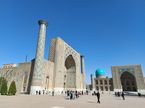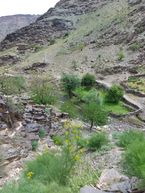New Perspectives on Energy Security in EU-China Relations – Prospects and Consequences for the European Union
The Research Project

My doctoral project currently has the title “New Perspectives on Energy Security in EU-China Relations – Prospects and Consequences for the European Union”. It aims to address the issue of influences of the People´s Republic of China (PRC or China) on the EU´s foreign energy policy by analysing interdependencies and linkages between the two actors in energy contexts within Central Asia. While it is one of the most important regions when it comes to energy sources and strategic linkages between China and the EU, the region of Central Asia is often overlooked. On the one hand, and not only since the new Green Deal by the European Commission of December 2019, there is a need to diversify the primary energy mix of the EU. Natural gas will play a decisive role in accomplishing this objective. China on the other hand accounts for 25 percent of the world´s energy usage and is the largest importer of oil and gas. Large parts of natural gas imports are transported via pipelines from Central Asia. Energy is a key driver of connectivity between Europe and Asia and serves as an important backdrop for political and economic cooperation, especially in terms of Central Asia. In Central Asia, both the EU and China have similar interests in securing energy resources (e.g. natural gas and oil) – however, they follow different paths of political and economic cooperation. While China is proactively establishing bilateral trade agreements with massive investments in energy and infrastructure projects, the EU is still focussing on a value-driven approach to develop cooperation agreements with Central Asian states. Although the EU developed different strategies to approach Central Asia as well as China in cooperation and energy matters, only small steps are visible and hardly any substantive achievement exists to date. My doctoral project therefore analyses both actors´ interests and approaches to the Central Asian region by looking at possible cooperation aspects and potential risks for conflicts. The focus of my research will mainly be centred around energy security as a crucial part of the EU´s foreign policy agenda.
IRB funded activities
The Case of Central Asia (April to June 2021)
The dissertation project examines the relations between the EU and China in the field of energy and security policy, with a focus on Central Asia. The region serves as an object of investigation for the different approaches of the EU and China and offers opportunities to analyze the impact of China's engagement on European foreign and security policy. During the stay, expert interviews were carried out with representatives from business and politics. Being on site opened up contacts and new networks, which helped the research project to gain new depth and sophistication. In regions such as Central Asia, it is also hardly possible to gain access to institutions such as ministries or to establish contacts with important business representatives if one is not personally in town or approachable. Thanks to local networking, I was able to actually conduct an interview with a high-ranking representative of the Ministry of Energy. Of the five Central Asian countries, Uzbekistan is currently the most dynamically developing country. Therefore, it is interesting to see very well where the path of the region will lead in the future. As a visiting fellow at Westminster International University in Tashkent, I was also able to take the first preparatory steps for a possible collaboration with Ruhr-Universität Bochum.
Conference on „Commercial Law at the Time of Change: New Imperatives and International Standards” (May 27 to June 6, 2022)
The dissertation project examines the relations between the EU and China in the field of energy and security policy, with a focus on Central Asia. The region serves as an object of investigation for the different approaches of the EU and China and offers opportunities to analyze the impact of China's engagement on European foreign and security policy. One year after my first visit to Uzbekistan, I was invited by the Westminster International University in Tashkent (WIUT) to participate as a distinguished speaker on the Conference on “Commercial Law at the Time of Change: New Imperatives and International Standards” on May 27, 2022. The conference was a valuable platform to present a core aspect of my doctoral research project, security in energy security research, and furthermore receive feedback and ideas from academic exchange. The chair of the School of Law, Akbar Ismanjanov, and I had a good talk on collaboration ideas between the WIUT and RUB which we seek to take to the next level.
Once in Central Asia, I organized few more interviews with experts for my empirical part of the dissertation. These were carried out in Tashkent, Uzbekistan and Bishkek, Kyrgyzstan. Gaining insights from personal meetings with experts working in the region is a unique quality added to my research project on EU-China relations in third countries.
AIEE 7th Symposium on Energy Security (14-16 December 2022, virtual conference)
Power shifts, insecurity in energy supply and distribution, global supply chain reliability and other topics highlight a dynamic development on world markets and between countries. In the AIEE 7th Symposium on Energy Security, my presentation focused on the term “security” and what academic definitions and concepts exist. Moreover, I discussed the understanding of security in foreign energy and security policy and the approaches of China and the EU toward Central Asia. So far, ‘energy security’ lacks an in-depth analysis of ‘security’ as a pre-analytical step. Security and its academic understanding incorporated in foreign policy strategies is of importance for a successful implementation and sustainability of cooperation and connectivity mechanisms. Therefore, it is substantial to analyse the understanding in an actor´s foreign policy approach to evaluate success or inhibiting dynamics when it comes to implementation in third countries, in my case, Central Asia.
European Union in International Affairs (EUIA) Conference “Europe´s Pathways to (Dis)Engagement with the World” (Brussels, 3-5 May 2023)
Energy as a basis for economic development fulfils central tasks in times of global reorganization. Whether a state is well-equipped with energy supplies or not relies to a large extent on transnational cooperation and connection. These bring with them renewed questions about security: whether it is a matter of obtaining fossil fuels, manufacturing mechanical components, or exchanging the latest research for future forms of energy – security of energy plays a role at various levels and in various forms. Despite the usefulness for higher efficiencies and profitability through global supply chains and interconnection, “exposing operational technology to greater access and interconnectivity, also creates innumerable attack vectors”1 . Increased connectivity in infrastructure linked to energy and security contrasts with a decreasing trend in the implementation of projects backed by state cooperation. This study discusses the different approaches of the EU and China toward Central Asia in energy security matters. A special focus is dedicated to the reflection of the term and understanding of ‘security’ in the EU´s and China´s foreign energy security policies to the Central Asian region. Successively, the approaches and implementation of engagement in the region are evaluated and provide an analysis of missing links to substantial engagement in the region. With a more assertive China, the question of efficient cooperation in Central Asia for distinct connectivity and mutual benefits will need to be addressed within the EU for the coming years.
1 Dupuy, A. et al. (2021) ‘Energy security in the era of hybrid warfare’, NATO Review, January, pp. 1–8. Available at: www.nato.int/docu/review/articles/2021/01/13/energy-security-in-the-era-of-hybrid_warfare/index.html




